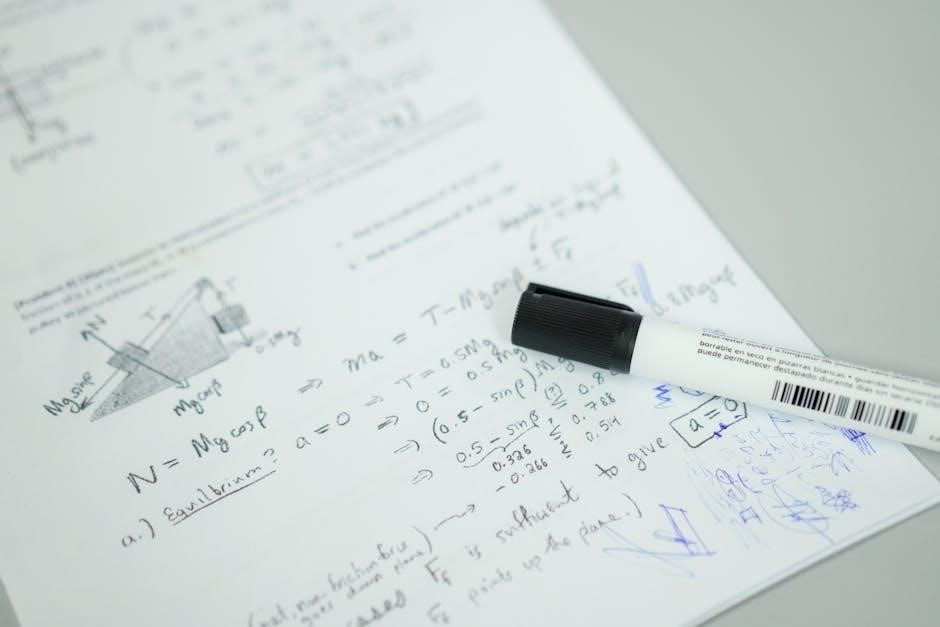Year 6 Maths tests assess students’ understanding and skills in mathematics, preparing them for secondary school. These tests, part of KS2 SATs, cover various topics like number operations, fractions, algebra, and geometry. Students, parents, and teachers can use past papers and practice tests to prepare effectively, ensuring confidence and readiness for the assessments. Printable PDF resources with answers are widely available, offering a comprehensive guide for revision and understanding test expectations.
1.1 Purpose and Importance of Year 6 Maths Tests
Year 6 Maths tests are designed to assess students’ mastery of key mathematical skills and concepts taught throughout Key Stage 2. These tests play a crucial role in measuring a child’s understanding of arithmetic, problem-solving, and reasoning abilities. The results provide valuable insights into a student’s academic progress, helping identify strengths and areas for improvement. Additionally, the tests serve as a baseline for secondary schools to understand incoming students’ mathematical proficiency. Using Year 6 Maths test PDFs with answers allows students to familiarize themselves with the test format, practice time management, and build confidence. This preparation is essential for achieving their best possible performance.
1.2 Structure of the Tests

Year 6 Maths tests are divided into two main papers: Paper 1 (arithmetic) and Paper 2 (reasoning). Paper 1 focuses on quick mental maths and calculation skills, while Paper 2 involves problem-solving and applying mathematical concepts. Each paper includes a variety of question types, such as multiple-choice and open-response questions, to assess different skills. The tests are timed, with 30 minutes allocated for Paper 1 and 40 minutes for Paper 2. Practice tests, including PDFs with answers, mirror this structure, allowing students to familiarize themselves with the format and improve time management. These resources are invaluable for building confidence and ensuring readiness for the actual assessments.

Key Topics Covered in Year 6 Maths Tests
The tests cover essential maths skills, including number and place value, fractions, decimals, percentages, multiplication, division, algebra, and geometry, ensuring a comprehensive assessment of mathematical understanding.
2.1 Number and Place Value
Number and place value are fundamental topics in Year 6 Maths tests, focusing on understanding digits, positions, and their significance in numbers. Students are assessed on their ability to read, write, and compare large numbers up to millions. Key skills include identifying place values, such as units, tens, hundreds, thousands, and beyond, as well as rounding numbers to the nearest ten, hundred, or thousand. These exercises help build a strong foundation for more complex operations. Practice tests and PDF resources provide numerous exercises, ensuring students can accurately determine place values and perform operations with precision, which is crucial for higher-level mathematics.

2.2 Fractions, Decimals, and Percentages
Fractions, decimals, and percentages are core components of Year 6 Maths tests, focusing on understanding equivalences and relationships between these forms. Students learn to simplify fractions, convert decimals to fractions, and calculate percentages of numbers. Key skills include adding and subtracting fractions with different denominators, converting decimals to percentages, and solving real-world problems involving money, measurements, and statistics. Practice tests and PDF resources provide exercises to master these concepts, ensuring students can apply them confidently. These skills are essential for higher-level mathematics and everyday applications, making them a critical part of the curriculum. Regular practice with past papers helps reinforce understanding and improves problem-solving abilities.

2.3 Multiplication and Division
Multiplication and division are fundamental arithmetic operations assessed in Year 6 Maths tests. Students are expected to demonstrate proficiency in multiplying and dividing multi-digit numbers, including long division and mental maths strategies. Key skills include applying distributive laws, solving word problems, and interpreting remainders. Practice tests and past papers provide ample opportunities to refine these skills, ensuring accuracy and speed. Mastery of these operations is crucial for tackling more complex topics like algebra and geometry later in the curriculum. Regular practice with PDF resources and answer sheets helps students build confidence and fluency in these essential mathematical skills.
2.4 Algebra and Geometry
Algebra and geometry are critical areas in Year 6 Maths tests, focusing on problem-solving and spatial reasoning. Students explore simple algebraic expressions, solving equations, and graphing basic shapes. Geometry involves understanding properties of 2D and 3D shapes, including symmetry, angles, and perimeter calculations. Practice tests and past papers provide exercises to master these concepts, with answer sheets offering clarity on solutions. These topics build foundational skills for higher-level mathematics, emphasizing logical thinking and visualization. Regular practice with PDF resources helps students approach challenging questions with confidence, ensuring a solid grasp of algebraic and geometric principles essential for future academic success.

3.Preparing for the Year 6 Maths Test

Preparing for the Year 6 Maths Test
Effective preparation involves using Year 6 Maths test PDFs with answers to practice and understand key concepts. Regular practice with past papers and structured revision plans help build confidence and improve problem-solving skills. Utilizing answer sheets ensures clarity in understanding mistakes and mastering topics. Consistent effort and focused study strategies are essential for achieving success in the tests.
3.1 Study Tips and Revision Strategies

Effective preparation for the Year 6 Maths test involves a combination of structured study and smart revision strategies; Start by understanding the syllabus and breaking it into manageable topics. Use Year 6 Maths test PDFs with answers to identify weak areas and focus on improvement. Regular practice with past papers helps build familiarity with the test format and timing. Prioritize understanding concepts over memorization, as this enhances problem-solving skills. Encourage active learning by teaching maths concepts to others or explaining them aloud. Incorporate visual aids like diagrams and charts to simplify complex topics. Regular breaks and a balanced study schedule prevent burnout. Stay positive, persistent, and proactive to achieve the best results.
3.2 Practicing with Past Papers
Practicing with past papers is an essential part of preparing for the Year 6 Maths test. Past papers provide students with real-life examples of test questions, helping them understand the format, timing, and question types. Use KS2 SATs papers and practice tests to identify weak areas and focus on improvement. Start by attempting questions without a calculator, as this mirrors the actual test conditions. After completing a paper, compare answers with the provided mark schemes to assess performance. This method helps students learn from mistakes and develop problem-solving strategies. Regular practice builds confidence and familiarity with the test structure, ensuring students are well-prepared for the actual assessment.
3.3 Understanding the Marking Scheme
Understanding the marking scheme is crucial for interpreting test results and improving performance. The marking scheme provides detailed criteria for awarding marks, ensuring fairness and consistency. For Year 6 Maths tests, marks are allocated based on accuracy, method, and problem-solving skills. Partial marks may be awarded for correct methods, even if the final answer is wrong. Familiarizing yourself with the scheme helps identify areas for improvement and highlights common errors. Mark schemes are often included in past papers and practice test PDFs, allowing students and teachers to review and understand expectations. By studying the marking criteria, students can better align their answers with what examiners look for, enhancing their scores and confidence. This insight is invaluable for targeted revision and preparation.

Year 6 Maths Test PDF Resources
Year 6 Maths test PDFs with answers are available online, offering past papers and practice tests. These resources help students and teachers prepare effectively for exams;
4.1 Where to Find Free Practice Tests
Free Year 6 Maths practice tests in PDF format can be found on educational websites and platforms. Many schools and tutoring services offer downloadable resources. The UK Government’s education portal provides past SATs papers with answers, while websites like Twinkl and Teachit offer a variety of practice tests. Additionally, platforms like Third Space Learning and KS2 Maths SATs provide free resources. These materials include mock tests, revision guides, and answer sheets, helping students and teachers prepare effectively. Utilizing these resources ensures access to high-quality practice materials without any cost.
4.2 How to Use Answer Sheets Effectively
Answer sheets are invaluable for assessing progress and understanding in Year 6 Maths tests. After completing a practice test, students should compare their answers with the provided solutions to identify mistakes. Reviewing incorrect answers helps clarify common misconceptions and strengthens problem-solving skills. Teachers and parents can use answer sheets to track progress and tailor revision strategies. Additionally, marking schemes explain how points are awarded, allowing students to understand the expected standards. Regular use of answer sheets fosters a deeper understanding of test formats and question types, building confidence and readiness for the actual exam. Effective use of these resources ensures targeted practice and improved performance.

Mental Maths and Problem-Solving Strategies
Mental maths enhances quick calculation skills, while problem-solving strategies help tackle challenging questions effectively. These techniques are crucial for building confidence and improving performance in Year 6 Maths tests.
5.1 Developing Quick Calculation Skills
Quick calculation skills are essential for mental maths and problem-solving in Year 6 Maths tests. Regular practice with past papers and practice tests helps students improve speed and accuracy. Resources like Year 6 Maths test PDFs with answers provide exercises designed to enhance mental agility. These materials often include timed drills and challenging questions to refine calculation strategies. By mastering number facts, estimation techniques, and arithmetic operations, students can tackle problems efficiently. Consistent practice builds confidence and fluency, enabling students to perform well under exam conditions. These skills are foundational for higher-level maths and real-world problem-solving, making them a critical focus for Year 6 preparation.
5.2 Approaches to Tackle Challenging Questions
Challenging questions in Year 6 Maths tests require strategic approaches to ensure success. Students should break down complex problems into smaller, manageable steps, using visual aids like diagrams or charts to clarify concepts. Practicing with past papers and PDF resources helps identify common question types and develop tailored strategies. Encouraging careful reading of instructions and identification of key information is vital. Time management is also crucial; allocating specific periods for each question prevents overwhelmed feelings. Utilizing marking schemes to understand expected answers can refine problem-solving techniques. By fostering a systematic mindset and practicing regularly, students build resilience and confidence to tackle even the most demanding questions effectively.

Leave a Reply